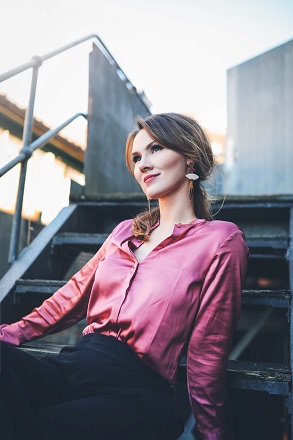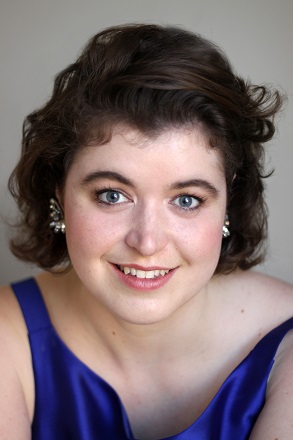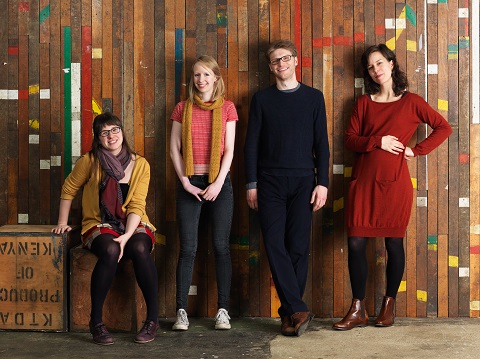27 Sep 2019
An interview with Cheryl Frances-Hoad, Oxford Lieder Festival's first Associate Composer
“Trust me, I’m telling you stories …”

“Trust me, I’m telling you stories …”
Jeanette Winterson’s words, from her 1993 novelWritten on the Body, would make a good epigraph for this year’s Oxford Lieder Festival. In recent years the Festival has shone a spotlight variously on Schubert’s entire song oeuvre, ‘Poets and their Songs’, and Gustav Mahler and fin-de-siècle Vienna. Last year the Festival undertook a ‘Grand Tour’ - a European journey in song, which explored cultural influences from Finland to the south of Spain, from Dublin to Moscow.
Next month, the Festival’s focus will be storytelling. Tales of Beyond - Magic, Myths and Mortals will comprise a multitude of narratives, mischievous, magical and musical. In fact, one might argue that all music-making is about telling a story, whether it takes the form of a song setting a single poem, the development of a drama in a symphony or opera, or the conversational interplay of chamber music. Music’s ‘meaning’ may be ultimately ineffable, from ‘beyond’, but there’s no doubt that it ‘speaks’ to us, communicating the real and the imagined, directly and ‘magically’.
The 2019 Festival also marks the start of Cheryl Frances-Hoad’s three-year appointment as Oxford Lieder’s first Associate Composer. “It’s phenomenal,” says Cheryl, when I meet with her to discuss her new role. “To have the position for one year would be fantastic, but three years is incredible.” Cheryl explains how her association with the Festival’s founder and Artistic Director, Sholto Kynoch, has developed. In 2011, as a member of the Phoenix Piano Trio, pianist Kynoch and his fellow musicians premiered Cheryl’s The Forgiveness Machine , which the Trio had commissioned as part of their Beyond Beethoven project. Subsequently they recorded the work on Stolen Rhythm , a disc of Cheryl’s music for the Champs Hill label. In 2016, Oxford Lieder commissioned The Thought Machine , a new song-cycle for performance at a concert for children. An Arts Council grant enabled Cheryl to develop the piece into a participatory work involving music, poetry and hand shadows, working with singer-pianist ensemble Songspiel and hand shadowgrapher Drew Colby who have toured The Thought Machine to schools in Peterborough and Cambridge and will bring it back to this year’s OLF.
As Associate Composer, Cheryl’s music will be heard frequently during the next three Oxford Lieder Festivals. Each year a new work will be commissioned. This year, Cheryl’s setting of Baudelaire’s ‘Une Charogne’ will be included in a programme of French Fables performed by contralto Jess Dandy and Sholto Kynoch, while in 2020 a new 20-minute work for soprano and piano will be premiered, with a longer 45-minute composition following in 2021. It’s an ambitious, extended project for Oxford Lieder. Cheryl suggests that since the Festival was founded in 2002, a strong relationship between the large, regular audience and the Festival has developed, in ways that have allowed for increasingly more adventurous programming.
 Marta Fontanals-Simmons Photo credit: Victoria Cadisch.
Marta Fontanals-Simmons Photo credit: Victoria Cadisch.
Thus, this year’s Festival will also include new works by other composers. Mezzo-soprano Kitty Whatley and pianist Simon Lepper will perform Juliana Hall’s ‘monodrama’ Godiva, which sets a libretto by Caitlin Vincent, in a programme of Fairy Tales from Stanford to Sondheim. The following evening sees the world premiere of Martin Suckling’sThe Tuning , a song-cycle setting the poetry of Michael Donaghy, by mezzo-soprano Marta Fontanals-Simmons and pianist Christopher Glynn, in a recital which also includes a performance of Schubert’s Die schone Müllerin by baritone Roderick Williams.
‘Une Charogne’ posed a new challenge for Cheryl as it was the first time that she had set a French text. She explains that she was grateful for the help and advice offered by Helen Abbott, Professor of Modern Languages at Birmingham University, who has a special research interest in nineteenth-century French poetry and music, and who, during the 2018 OLF presented a collaborative coaching masterclass day for singer/pianist duos focusing on French song, especially Verlaine/Debussy.
Helen’s current research project is the Baudelaire Song Project . She helped Cheryl - whose last experience of reading and speaking the language was during her GCSE French studies! - with Baudelaire’s text, explaining matters such as pronunciation, how to divide the syllables of a word and the correct text layout on the score. She also made recordings of the poem, at both a slow and normal speaking speed. In addition to studying a translation of the poem, Cheryl also translated each individual word herself; before she began her musical setting, she could speak the text fluently.
 Jess Dandy. Image courtesy of the Oxford Lieder Festival.
Jess Dandy. Image courtesy of the Oxford Lieder Festival.
Taken from Baudelaire’s Fleur du mal, ‘Une charogne’ is a startling, almost Goya-esque, memento mori in words. The eponymous carcass inspires incongruous images, and as themes of love and life, death and horror weave together, the beautiful and grotesque collide. Alternating Alexandrine and octosyllabic lines create a natural ebb-and-flow, and individual sounds enhance the ‘musicality’ of the poem. But, I ask Cheryl, how on earth does one go about finding musical imagery to embody phrases such as, “The blowflies were buzzing round that putrid belly,/ From which came forth black battalions/ Of maggots, which oozed out like a heavy liquid” (Les mouches bourdonnaient sure ce ventre putride,/ D’où sortaient de noirs bataillons/ De larves, qui coulaient comme un épais liquide)? A glance at the score suggests that Cheryl hasn’t been averse to some literal word-painting at times - there’s a very busy, decorative right-hand line at the point of the aforementioned image of decay - but her setting seeks to present the poem’s incongruities in a more holistic way, and to capture equally the poem’s bizarre humour, ecstatic reveries and its graver intimations of distortion, dissolution and decay.
A second composition by Cheryl will have its world premiere during the OLF, though it was not specifically commissioned by the Festival. Endless Forms Most Beautiful , a song-cycle for soprano and string quartet, will be performed in Oxford’s Museum of Natural History by soprano Carola Darwin and the Gildas Quartet. In 2000, Cheryl met Carola, who is Charles Darwin’s great-great-granddaughter, when she took part in a competition run by the Darwin Centre at the Natural History Museum. “I didn’t win,” Cheryl smiles, “but I did become friends with Carola” and the idea of a cycle of songs setting texts about the environment and evolution was borne. 19 years later, it has come to fruition.
Endless Forms Most Beautiful takes its title from Charles Darwin's On the Origin of Species:
There is grandeur in this view of life, with its several powers, having been originally breathed by the Creator into a few forms or into one; and that, whilst this planet has gone cycling on according to the fixed law of gravity, from so simple a beginning endless forms most beautiful and most wonderful have been, and are being, evolved.
 Gildas Quartet. Image courtesy of the Oxford Lieder Festival.
Gildas Quartet. Image courtesy of the Oxford Lieder Festival.
Its seven songs set texts by the 19th-century poet Walter Deverell (‘The Garden’) and the NHM’s three 2016 Poets-in-Residence: Kelley Swain (‘To the Paleontologists’, ‘Cetacean Introduction’, ‘Bones’, ‘Thermodynamics of Immortality’), John Barnie (‘Let’s Do It’) and Steven Matthews (‘Yet With Time’s Cycles Forests Swell’). I ask Cheryl how she went about selecting the texts. “We chose poems that we liked and that fitted the theme. At that stage I didn’t pay much attention to potential issue relating to text-setting, and in fact some of the poems are quite long and in some places I have cut some text.” Do they present an unfolding ‘narrative’? “Not really, they do all relate to the general theme but could be performed as individual songs.”
During the next three years, OLF will present all of Cheryl’s existing songs, as well as selected chamber music, and piano and choral works. Next month, Jess Dandy and Dylan Perez will performBeowulf, Cheryl’s 2010 setting of extracts from Seamus Heaney’s translation of the Old English epic. Pianist Ivana Gavrić will play four of Cheryl’s piano works in a concert including works by Clara Schumann and Edvard Grieg, and the Choir of Merton College will sing Bogoroditse Dyevo which was composed as part of a project to create six new works, by six different composers, each of which was inspired by an earlier work, and for which Cheryl drew upon Rachmaninov’s well-known Vespers.
Cheryl’s works include a Piano Concerto, Cello Concerto, several large-scale works involving young musicians and much chamber music, but she has perhaps been most widely acclaimed as a composer of songs and other vocal works. I ask her if she feels a particular predilection for working with words, and she admits that she does find that working with a text makes composition ‘easier’ to some extent. Her oeuvre is extensive, and her music is frequently performed. However, Cheryl feels that she is reaching a point in her career where she would like to make some space and time to reflect on her longer-term plans. “During the last 10 years I’ve enjoyed being able to compose many works ‘for my friends’, but now I’d like to ask myself, ‘what do I want to write?’,” she laughs. Might she also want to expand her canvas? Three choral works will be her immediate compositional focus but after that … perhaps an opera, and other larger works? She hints at some forthcoming projects, which will present fresh and exciting challenges.
The 2019 Oxford Lieder Festival runs from 11-26 October. Claire Seymour